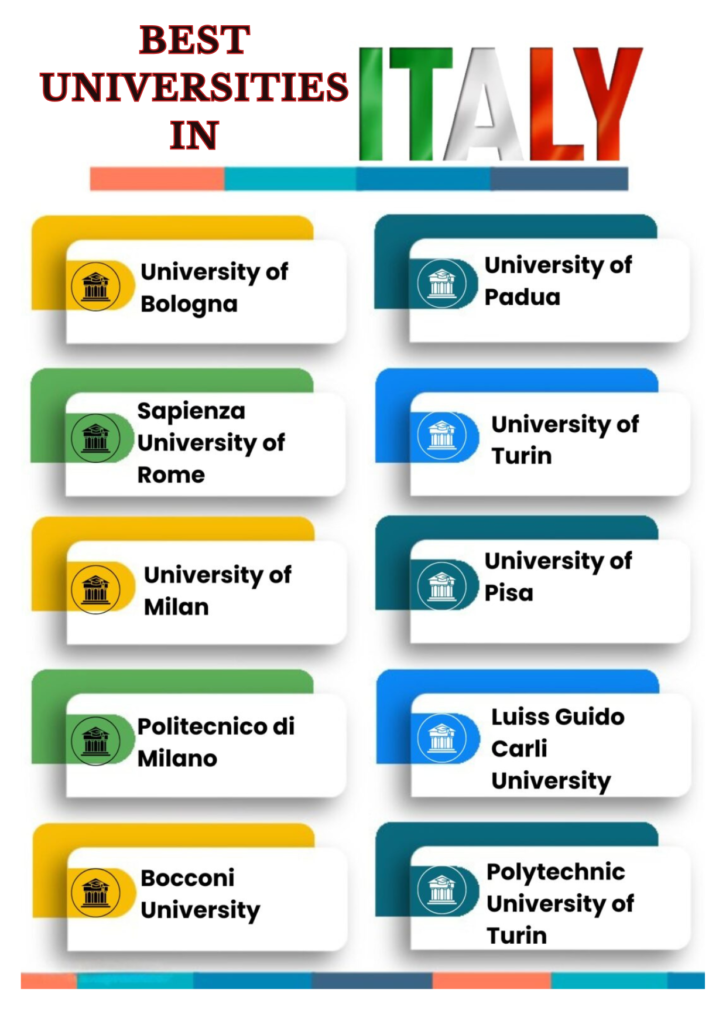
Telangana.India
Send an e-mail
Call Us Now
Looking to Study in Italy from Hyderabad? Munu International is one of the Best Italy education consultants in Hyderabad, helping students secure admissions in top Italian universities. If you want to Study in Italy, we provide expert counselling, course guidance, and full visa support to make your 2025 intake smooth and hassle-free.

High-Quality Education: France is home to some of the world’s top universities and Grandes Écoles, offering a diverse range of programs known for their academic rigor and innovation.
Cultural Experience: Studying in France allows you to immerse yourself in a rich cultural environment, with access to historical landmarks, art, and cuisine.
Affordability: Tuition fees in France are relatively low compared to other popular study destinations, particularly for EU/EEA students. Additionally, numerous scholarships are available for international students to help offset costs.
Career Opportunities: France has a strong job market, particularly in sectors like business, engineering, and technology. Studying in France can provide valuable networking opportunities and internships, enhancing your employability in Europe and beyond.
We are committed to supporting you at every stage of your educational journey by providing a range of services, including:
University Selection: We assist you in identifying the best university that aligns with your academic interests and career aspirations.
Application Support: Our experts offer guidance on completing and submitting applications, enhancing your chances of acceptance.
Visa Assistance: We provide comprehensive support to help you navigate the student visa process smoothly and efficiently.
Pre-Departure Orientation: We prepare you for your upcoming journey with essential information on accommodation options, cultural norms, and other important aspects of living abroad.


Tuition fees in Italy can vary based on the university, program, and your nationality. Public universities typically charge lower tuition rates for EU/EEA students compared to private institutions, which may have higher fees. International students often face different fee structures but still find them generally reasonable. Additionally, various scholarships are available to support international students, provided by the Italian government, universities, and external organizations. These financial aids can help alleviate the cost of education in Italy.
Non-EU/EEA students generally require a student visa to pursue their studies in Italy. To obtain a student visa, you must apply through the Italian consulate or embassy in your home country. The application process typically requires a letter of acceptance from an Italian university, proof of sufficient financial resources, and valid health insurance. Additional documentation may also be needed, depending on your specific situation. It’s essential to prepare all necessary documents in advance to ensure a smooth visa application process.
Italy offers various accommodation options, including university dormitories, private apartments, and shared housing. Many universities provide assistance in finding suitable accommodation.
International students in Italy are allowed to work part-time during their studies. Non-EU/EEA students can typically work up to 20 hours per week during term and full-time during holidays.
Italy’s rich history, art, architecture, and cuisine create a vibrant and captivating environment for students. The country’s beautiful landscapes, cultural experiences, and warm climate add to its appeal.
Valid Passport – Must be valid for the entire study duration.
Letter of Admission / Enrollment – From a recognized Italian university.
Visa Application Form – Completed online and submitted at the Italian Consulate.
Proof of Financial Means – Minimum €11,000 per year to cover living expenses.
Proof of Accommodation – University residence, hostel, or rental agreement.
Academic Documents – Certificates, mark sheets, and transcripts.
Language Proficiency – IELTS/TOEFL for English programs, or Italian language certificate for Italian-taught courses.
Passport-Sized Photographs – As per Italian visa specifications.
Health Insurance – Covering the entire period of stay in Italy.
Visa Application Fee – Around €116–€120 (approx. ₹11,000).
Statement of Purpose (SOP) / Motivation Letter – Explaining study plans in Italy.
Police Clearance Certificate – To prove good character.
Consular Interview – May be required at the Italian Embassy/Consulate.
Here’s a list of Top Italy universities popular among Indian students:
University of Bologna – One of the oldest universities, strong in arts, humanities, and engineering.
Sapienza University of Rome – Known for medicine, law, and architecture programs.
University of Milan – Offers programs in business, science, and engineering.
Politecnico di Milano – Leading in engineering, design, and technology.
Bocconi University – Renowned for business, finance, and economics.
University of Padua – Popular for medicine, sciences, and law.
University of Turin – Offers programs in law, engineering, and arts.
University of Pisa – Strong in science, engineering, and computer science.
Luiss Guido Carli University – Known for business, economics, and law.
Polytechnic University of Turin – Focused on engineering, architecture, and design.

While many universities offer programs in English, having some knowledge of Italian can enhance your experience. Some programs might have language requirements, so check with the specific university.
Entry requirements vary by university and program. Generally, you’ll need academic transcripts, language proficiency test scores (such as IELTS, TOEFL or PTE), letters of recommendation, a statement of purpose, and sometimes a portfolio (for arts-related programs).
Tuition fees vary widely depending on the university, program, and level of study. Public universities in Italy tend to have lower tuition fees, especially for EU/EEA students. Private universities might have higher costs.
Yes, there are scholarships available for international students from both Italian universities and external organizations. These scholarships can significantly offset tuition and living expenses.
Yes, international students can work part-time during their studies. Non-EU/EEA students are usually allowed to work up to 20 hours per week during term and full-time during holidays.
Non-EU/EEA students typically need a student visa to study in Italy. You’ll need to apply for a student visa through the Italian consulate or embassy in your home country. Requirements may include a letter of acceptance, financial proof, health insurance, and more.
Accommodation options in Italy include university dormitories, private apartments, and shared housing. Many universities offer assistance in finding suitable accommodation.
Yes, Italy offers a “Stay Back Option” that allows non-EU/EEA graduates to stay in Italy for a specific period after graduation to seek employment or start a business.
Yes, health insurance is mandatory for all international students in Italy. You can either opt for the public health insurance or get private health insurance.
If your program is in English, you might need to provide English language proficiency test scores, such as IELTS or TOEFL. Some universities may waive this requirement if your previous education was in English.
Most Italian banks offer student bank accounts. You’ll need to provide your passport, residence permit, proof of enrollment, and sometimes proof of address to open an account.
Italy has various types of higher education institutions, including universities, polytechnics, and specialized schools. Research the type of institution that aligns with your academic goals.
The cost of living varies depending on the city and lifestyle. It includes accommodation, food, transportation, and other expenses. It’s important to budget accordingly.
Always verify information from official sources, such as the Italian embassy or consulate in your country and the websites of universities you’re interested in, as details can change over time.
Munu International stands out as a prominent consultancy specializing in global education, committed to guiding Indian students in realizing their academic ambitions on the international front. Our resolute dedication to excellence and an enduring enthusiasm for education have established us as a reliable partner in helping students pursue their overseas study dreams.
Flat no:101, First Floor, Ameer Estate,
beside S.R. Nagar Bus stop, Ameerpet, Hyderabad-500038
Opp.Metro Pillar -1038
Copyright © 2023, All Rights Reserved By Munu International | Powered by Sky High Digitals